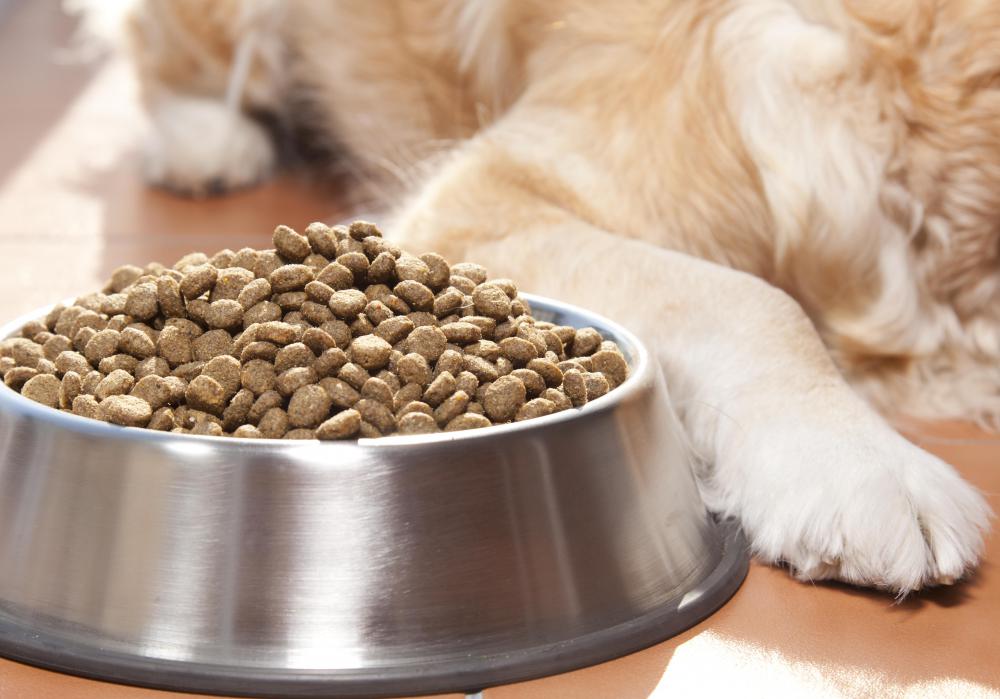At AllThingsNature, we're committed to delivering accurate, trustworthy information. Our expert-authored content is rigorously fact-checked and sourced from credible authorities. Discover how we uphold the highest standards in providing you with reliable knowledge.
What is a Japanese Chin?
A Japanese Chin, also known as a Japanese Spaniel, is a toy dog that has been prized by Japanese royalty. This dog is bred specifically for companionship as it is very affectionate. The Chin is a cuddly lap dog, but can also be very independent, preferring to sleep on the back of a chair or couch.
The Japanese Chin stands approximately 10 inches (25.4 cm) tall at the shoulders and weighs approximately 8 pounds (3.63 kg). They have long silky hair and a tail that curls upward. Chins are usually black and white, though other colors include red, white, sable and tan.

The Chin is known to suffer from breathing and heart problems, due to its flat face. Other medical predispositions include luxating patellas, hypoglycemia, seasonal allergies and sensitivity to extreme heat. The Japanese Chin has very large eyes that are prone to being scratched. This can result in eye ulcerations, which can be treated by applying a canine antibacterial eye ointment.
A Japanese Chin is relatively easy to care for. They are low-energy dogs that require little exercise, making them the perfect apartment dog. Other than alerting you to the presence of strangers, they are very quiet. This breed of dog does require a lot of grooming, though, due to their long hair.
Grooming a Chin involves bathing her once a month with an herbal shampoo. Chins have very sensitive skin that is prone to developing dermatitis. Blow dry your dog after every bath to prevent her from catching a chill. After your dog is dry, apply a conditioning oil, to prevent her long hair from developing tangles. Cut her nails and brush her teeth at least twice a month.
The health of a Japanese Chin's coat depends upon her eating a well-rounded diet. Feed her an all natural dog food that is high in vegetable content. A Chin will also benefit from eating prepared meals that include food from her native diet, such as rice, pork, fish and greens.
To help prevent excessive shedding, add a small amount of Emu oil to your dog's dry food. The fatty acids in the oil will strengthen the hair, making it less likely to fall out. It will also condition her skin and make her less prone to developing dermatitis.
Walk your Japanese Chin for a short time, every day. This is all the exercise he really needs. Walks are a great time to bond with your dog. If you go to work every day, try to take this walk before then. Your Chin can use this time to defecate before being in the house all day.
As with any dog, when purchasing a Chin, research her background. Make sure you learn about any genetic disorders that are in her bloodlines. Learn about the temperament of her parents to make sure she isn't aggressive, especially if you have children. Chins, although friendly, are most suited for households without kids, due to their small size and low-energy requirements.
Frequently Asked Questions
What is a Japanese Chin?
The Japanese Chin is a small, elegant toy breed of dog known for its distinctive pushed-in face, large eyes, and luxurious coat. Originating from Asia, this breed was historically kept by nobility and has a charming and loving demeanor. They are companion dogs, prized for their intelligence and cat-like agility.
How big does a Japanese Chin get?
A Japanese Chin typically weighs between 4 to 9 pounds (1.8 to 4 kg) and stands about 8 to 11 inches (20 to 28 cm) tall at the shoulder. This makes them a perfect size for a lap dog and suitable for living in smaller spaces like apartments.
What is the temperament of a Japanese Chin?
Japanese Chins are known for their affectionate and mild-mannered temperament. They are sociable with family members and can be reserved around strangers. They possess a playful and intelligent nature, often performing tricks and entertaining their owners. Their sensitivity to their owner's emotions makes them excellent companions.
Are Japanese Chins easy to train?
Japanese Chins can be easy to train due to their intelligence, but they also have a stubborn streak. Positive reinforcement techniques work best. Early socialization and consistent, gentle training are key to raising a well-behaved Chin. They respond well to training that includes treats and praise.
What are the grooming requirements for a Japanese Chin?
Japanese Chins have a long, flowing coat that requires regular grooming. Brushing several times a week helps prevent tangles and mats. They also need occasional baths, but not too frequently to avoid drying out their skin. Regular eye cleaning is important due to their prominent eyes, and they require routine dental care.
How long do Japanese Chins typically live?
Japanese Chins have a relatively long lifespan for dogs, typically living between 10 to 14 years. With proper care, regular veterinary check-ups, a healthy diet, and adequate exercise, these dogs can enjoy a full and happy life as a cherished member of the family.
AS FEATURED ON:
AS FEATURED ON:











Discuss this Article
Post your comments